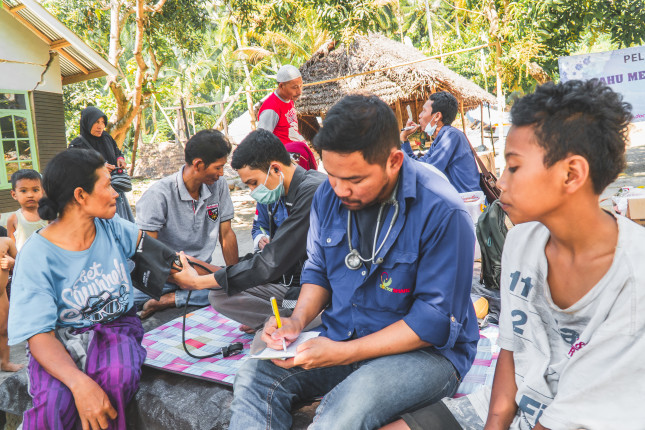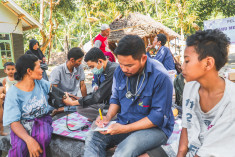-
Disasters Have Changed. So Must Our Response.
January 28, 2020 By Frederick M. Burkle As disasters have changed over the years, so must the personnel who manage these crises.
As disasters have changed over the years, so must the personnel who manage these crises.In 1932, sociologist Lowell Carr first described a predictable pattern of how disasters impact society. Refined over the decades by many researchers, the “disaster cycle” includes four phases: prevention, preparedness, response, recovery and rehabilitation.
This disaster cycle helped define the way societies respond to each disaster. Today, highly trained emergency personnel using many research, management, and epidemiological skills have helped improve survival and health outcomes after disasters. “Disaster medicine” now defines a sub-specialty for highly skilled professional health specialists. However, their many activities and skill sets primarily focus on only the response phase of the initial disaster cycle.

As disasters have changed over the years, so must the personnel who manage these crises.
In 1932, sociologist Lowell Carr first described a predictable pattern of how disasters impact society. Refined over the decades by many researchers, the “disaster cycle” includes four phases: prevention, preparedness, response, recovery and rehabilitation.
This disaster cycle helped define the way societies respond to each disaster. Today, highly trained emergency personnel using many research, management, and epidemiological skills have helped improve survival and health outcomes after disasters. “Disaster medicine” now defines a sub-specialty for highly skilled professional health specialists. However, their many activities and skill sets primarily focus on only the response phase of the initial disaster cycle.
That must change. Focusing on only the response phase will not suffice.
With the rise of new types of crises, societies face something quite different with new elements that demand more understanding in preparation, response, and recovery. If we knew more about what led to these crises, we would be better at both preventing and responding to them.
We now know that societies that put more resources into public health protections and prevention fare better during disasters. Studies of disasters show that mortality rates after disasters increase after the crisis ended. Higher death rates are primarily related to poor or inadequate public health recovery or the total lack of it.
Medicine has failed over the decades to fully understand the critical importance of public health prevention and preparedness in both understanding these new crises and how that knowledge can help mitigate and prevent consequences.
But today, multiple changes in the science and policy of crisis events have rapidly occurred, thanks to major educational advances and better training in public health in countries at great risk. We are seeing the proliferation of and growing support for major schools of public health, visionary academic programs and research in developing countries, and multiple global online courses. These elements are all tied to major communications advances that are helping spread a new and rapidly growing knowledge base once lost on many decision-makers in the world.
More Complex Crises
The crises we face today are not like those of the past when natural disasters were mostly finite in time and space. We are seeing more complex, unpredictable, and prolonged disasters due in part to climate change, climate extremes, rapid unsustainable urbanization, critical biodiversity losses, and emergencies related to scarce water, food, and energy. We are seeing prolonged and more powerful natural disasters; increasing numbers of migrants, refugees, epidemics, and pandemics; more victims of current conflicts and wars that are civilian and not military; the emergence of both international and domestic terrorism; chemical and biological incidents; the increasing proliferation of autocratic regimes and the loss of health security for their populations; increasing nuclear threats; and emergence of cybersecurity threats to health facilities and individuals alike.
Visualize a large Venn diagram with lines connecting all those crises just listed to their vast public health implications. In an increasingly specialized world, there is no room for those who do not recognize, or remain challenged by, the multidisciplinary and transdisciplinary skills needed to address these crises. I was recently encouraged to learn that that Johns Hopkins’ most popular undergraduate major was public health. And growing numbers of other non-health professionals are enrolling in schools of public health, global health policy, and ethics.
Dealing with disasters such as those listed has become a complex science that requires interdisciplinary skills. Healthcare providers today face more complex and multidisciplinary decisions when responding to a natural disaster. Health is just one aspect of efforts to mitigate mortality and morbidity. As a result, healthcare providers must call upon a broader knowledge base that straddles the entire disaster cycle and other contributing professions.
Needed: Multitasking Professional Crisis Managers
Decision-makers must call for the training and development of professional “crisis managers.” By recognizing that “crises” rather than “disasters” best defines the wide and integrated scope of these events, we must support priorities for multitasking career health crisis managers. In their work, they would handle the plethora of full disaster cycle needs, the multidisciplinary responsibilities and challenges uniquely demanded of today’s crises, and the directions needed to support education and research across all disaster cycle phases. While these challenges can only be met with phase-related strategic applications across the entire crisis cycle, health crisis professionals, in their roles as career crisis managers, must be able to meet the strategic and operational phase requirements of prevention, response, and recovery and rehabilitation to achieve major declines in mortality and morbidity.
Focusing only on the “response phase” may continue to be a viable approach for WHO Emergency Medical Teams sent to assist in sudden-onset disasters and other time-limited crises in poorer countries. However, health management skills alone do not suffice. Any healthcare crisis managers of the future need to have working knowledge of multidisciplinary factors that contribute to health outcomes. The larger, slow moving and increasingly complicated crises require that they understand the sociological, legal, political, cultural, and public health factors that shape health and well-being. Health crisis managers armed with equal expertise and authority in managing all phases of the disaster cycle—from prevention through recovery and rehabilitation—will be best positioned to prevent crisis-related deaths and mitigate poor health. This requires new thinking, professionalization of the health-related knowledge, and broad-based crisis management skills across the entire disaster-cycle if we are to fully realize successful outcomes to include the expected decline in crisis-related mortality and morbidity.
Dr. Frederick M. Burkle, Jr., a retired professor, is now Senior Fellow and Scientist at the Harvard Humanitarian Initiative, Harvard University and Harvard T.H. Chan School of Public Health, and a Wilson Center Global Fellow.
Sources: American Journal of Sociology, The Brown Journal of World Affairs, Prehospital and Disaster Medicine, Disaster Medicine and Public Health Preparedness, The Tohoku Journal of Experimental Medicine.
Photo Credit: Photo via Shutterstock. All rights reserved.
 A Publication of the Stimson Center.
A Publication of the Stimson Center.

 As disasters have changed over the years, so must the personnel who manage these crises.
As disasters have changed over the years, so must the personnel who manage these crises.

